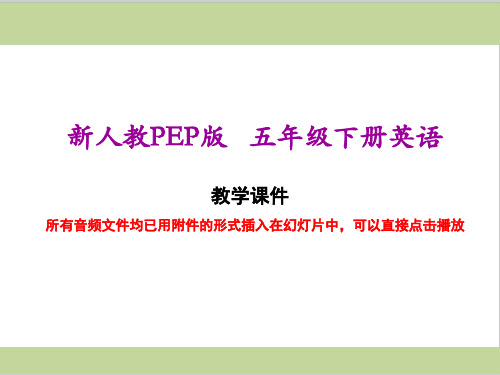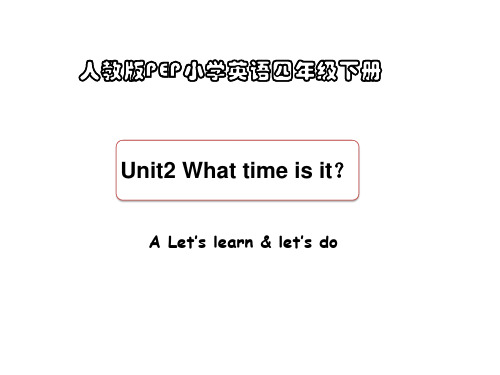小学英语课件-时间
合集下载
小学英语-一般现在时ppt课件

我们已学过的be 动词可译成“是”, 有时译成“成为”,有时则没有具体意 思如: “She is tall.”这句译成: “她很 高”。故be 动词不属于实义动词。
“雪亮工程"是以区(县)、乡(镇) 、村( 社区) 三级综 治中心 为指挥 平台、 以综治 信息化 为支撑 、以网 格化管 理为基 础、以 公共安 全视频 监控联 网应用 为重点 的“群 众性治 安防控 工程” 。
3) 一般疑问句及其肯、否定回答:
☺Do+主语(I/we/you/they)+动词原形+其他? 如:Do you stay at home on Saturdays? Yes,I do./No,I don’t. Do they have sports every day? Yes, they do./No, they don’t.
What time do you have lunch? What time does she have lunch?
What do you do? What does she do?
How do you spell it? 特殊疑问句: 疑问词+一般疑问句 How does he spell it? 直接回答,而不用yes 或no.
“雪亮工程"是以区(县)、乡(镇) 、村( 社区) 三级综 治中心 为指挥 平台、 以综治 信息化 为支撑 、以网 格化管 理为基 础、以 公共安 全视频 监控联 网应用 为重点 的“群 众性治 安防控 工程” 。
2) 否定句:
☺主语(I/We/You/They)+ do+not+动词原形+其他 如:I don’t stay at home on Saturdays. They don’t have sports every day.
“雪亮工程"是以区(县)、乡(镇) 、村( 社区) 三级综 治中心 为指挥 平台、 以综治 信息化 为支撑 、以网 格化管 理为基 础、以 公共安 全视频 监控联 网应用 为重点 的“群 众性治 安防控 工程” 。
3) 一般疑问句及其肯、否定回答:
☺Do+主语(I/we/you/they)+动词原形+其他? 如:Do you stay at home on Saturdays? Yes,I do./No,I don’t. Do they have sports every day? Yes, they do./No, they don’t.
What time do you have lunch? What time does she have lunch?
What do you do? What does she do?
How do you spell it? 特殊疑问句: 疑问词+一般疑问句 How does he spell it? 直接回答,而不用yes 或no.
“雪亮工程"是以区(县)、乡(镇) 、村( 社区) 三级综 治中心 为指挥 平台、 以综治 信息化 为支撑 、以网 格化管 理为基 础、以 公共安 全视频 监控联 网应用 为重点 的“群 众性治 安防控 工程” 。
2) 否定句:
☺主语(I/We/You/They)+ do+not+动词原形+其他 如:I don’t stay at home on Saturdays. They don’t have sports every day.
小学英语时态之 一般过去时讲解课件ppt

一般过去时态
一般过去时:
定义: 一般过去时,是表示过去某一时刻或某一段时间内发生的动作或存在
的状态。
标志词: yesterday, just now, …ago, last…, this morning …
结构: 谓语是be动词
谓语是行为动词
肯定句: 主语+ was/were + 其他 否定句: 主语+ was/were + not + 其他 一般疑问句: Was/Were + 主语+其他? 肯定句: 主语+ 动词的过去式 + 其他 否定句: 主语+ didn’t +动词原形 + 其他 一般疑问句:Did + 主语+ 动词原形 +其他?
at the weekends this morning often
usually
last Mid-Autumn Festival
every day three days ago on Mondays
tomorrow a moment ago 14 years ago
找出表示一般过去时的时间副词。
( B) 1. My mother had breakfast and____to work.
A. go B. went C. going D. to go
( A)2. -- How __ your vacation?
-- It was pretty good. A. was B. were C. did D. do
( )3.Each student one picture.
A.draw B. draws C. drawing D.to drawing
一般过去时:
定义: 一般过去时,是表示过去某一时刻或某一段时间内发生的动作或存在
的状态。
标志词: yesterday, just now, …ago, last…, this morning …
结构: 谓语是be动词
谓语是行为动词
肯定句: 主语+ was/were + 其他 否定句: 主语+ was/were + not + 其他 一般疑问句: Was/Were + 主语+其他? 肯定句: 主语+ 动词的过去式 + 其他 否定句: 主语+ didn’t +动词原形 + 其他 一般疑问句:Did + 主语+ 动词原形 +其他?
at the weekends this morning often
usually
last Mid-Autumn Festival
every day three days ago on Mondays
tomorrow a moment ago 14 years ago
找出表示一般过去时的时间副词。
( B) 1. My mother had breakfast and____to work.
A. go B. went C. going D. to go
( A)2. -- How __ your vacation?
-- It was pretty good. A. was B. were C. did D. do
( )3.Each student one picture.
A.draw B. draws C. drawing D.to drawing
新人教PEP版五年级下册小学英语 Unit 3 My school calendar 教学课件PPT

2._______________________ sing the birthday
song
3._______________________ eat noodles/ a
birthday cake
Let's wrap it up
Fill in the blanks.
in
at
March
on
Great Wall. Oliver:Cool! I love the Great Wall!
句型讲解:
We'll go to the Great Wall. 我们将要去长城。
will后接动词原形,表达将要发生的事情 缩写:I will→I'll, he will→he'll, she will→she'll,
Read and write
Easter Party WHEN: April 12th,7 p.m.
WHY: Easter holiday WHERE: Wu Yifan s home WHAT: We will play many games. We will roll Easter eggs. We will look for eggs. We will eat chocolate eggs. You will meet the Easter Bunny! RSVP:Will you come to the party? Please send an
January: New Year's Day February: winter vacation March: Tree Planting Day April: Easter party, sports meet May: singing contest, school trip, May Day,
人教版四年级英语下册第二单元PPT课件

2. 间接表达法 A. 如果分钟数少于30分钟,可用分钟 + past + 钟点表示,其中past是介词,意思是 “过”。如:
twenty past four 四点二十 eight past one 一点八分 B. 如果分钟数多于30分钟,可用(60分钟原分钟数)+ to +(原钟点数+ 1)表示, 其中to是介词,意思是“差”。 如: 8:35 可表示为twenty-five to nine 差二十 五分钟九点
人教版PEP小学英语四年级下册 Unit2 What time is it?
A Let’s learn & let’s do
minute hand 分针
What time is it? It’s 3 o’clock.
Is it time for dinner?
No, it isn’t. It’s time for music class.
clock有时钟的意思,o’clock是of the clock的缩写,用于表示钟 点数,一般情况下o’clock只用于表示整点。没有复数形式。
Let’s read together!
Do you know?
“到做某事的时间了”—It’s time for… 课文应用:It’s time for dinner.到吃晚餐的时间了。 句型结构:It’s time for+名词 it代表的是时间,不可用其他词代替。for后面直接接 名词,不需要用冠词修饰。
What time is it?
It’s 6 o’clock. It’s time for…dinner
场景1:John 与吴一凡的对话
OK.
场景2:John 与吴一凡在做什么?
新标准小学英语第九册M1 U1There wasn27t a clock here before精品PPT课件

他问我:“看有没有熟悉的朋友,帮孩子联系联系。”我问他:“孩子究竟要找什么样的工作?”他说:“没啥要求,工资高一点,离家近一点,最好能一步到位。孩子性格内向,不想来来回回折腾。”
我听后苦笑:“要求是不怎么高,但这样的工作还真不好找。”和朋友聊完天后,有那么几个词语在我的脑海里,“工资高一点,不想再折腾。”随后,我确实被这几个词吓到了,并且惊了一身冷汗。
但还有一种本领与及时获取正好相反,它们会随着时间沉淀,时间的迭代,时间的积累,最终迸发出巨大的力量。可这种能力,因为时间太短,并没有写入人们的记忆。以至于有时,人们颠三倒四,用错了地方。
比如财富积累和及时获取比起来,人类对财富,对资本,对积累,实在是见的不多,用的不多,思考的也不多。和及时获取比起来,实在太短,太少,就像一个蹒跚学步的孩子,一路跌跌撞撞,不知道什么叫害怕,什么叫危险。
在远古的狩猎时代,人们过着食不果腹,衣不裹体的生活,每一天都在为食物发愁,及时猎取食物就显得尤为重要。因为工具简易,加之那时人的大脑普遍不怎么发达,要捕获一些猎物非常不容易。
并且人多肉少,你不及时吃掉食物,别人就会掠夺那些食物。即使能捕获一些大型猎物,也因为不能很好的储存,食物常常会腐败变质。所以及时获取、即使享受,在几万年的演化中,逐渐成为人们一种本领,深深嵌入人们的意识。
一个短暂快乐的周末小假期,给予我的时光让我充分认识到: 我不会再装模作样地拥有很多朋友,而是要回到了真实独立的自我之中,以真正的我开始了独自的生活。 虽然有时我也会因为寂寞而难以忍受空虚的折磨,但我宁愿以这样的方式来维护自己的自尊,也不愿以耻辱为代价去换取那种表面的朋友。
正所谓,真正的生命不是你活了多少日子,而是你记住了多少日子。
• There are……now.
•
a new building.
我听后苦笑:“要求是不怎么高,但这样的工作还真不好找。”和朋友聊完天后,有那么几个词语在我的脑海里,“工资高一点,不想再折腾。”随后,我确实被这几个词吓到了,并且惊了一身冷汗。
但还有一种本领与及时获取正好相反,它们会随着时间沉淀,时间的迭代,时间的积累,最终迸发出巨大的力量。可这种能力,因为时间太短,并没有写入人们的记忆。以至于有时,人们颠三倒四,用错了地方。
比如财富积累和及时获取比起来,人类对财富,对资本,对积累,实在是见的不多,用的不多,思考的也不多。和及时获取比起来,实在太短,太少,就像一个蹒跚学步的孩子,一路跌跌撞撞,不知道什么叫害怕,什么叫危险。
在远古的狩猎时代,人们过着食不果腹,衣不裹体的生活,每一天都在为食物发愁,及时猎取食物就显得尤为重要。因为工具简易,加之那时人的大脑普遍不怎么发达,要捕获一些猎物非常不容易。
并且人多肉少,你不及时吃掉食物,别人就会掠夺那些食物。即使能捕获一些大型猎物,也因为不能很好的储存,食物常常会腐败变质。所以及时获取、即使享受,在几万年的演化中,逐渐成为人们一种本领,深深嵌入人们的意识。
一个短暂快乐的周末小假期,给予我的时光让我充分认识到: 我不会再装模作样地拥有很多朋友,而是要回到了真实独立的自我之中,以真正的我开始了独自的生活。 虽然有时我也会因为寂寞而难以忍受空虚的折磨,但我宁愿以这样的方式来维护自己的自尊,也不愿以耻辱为代价去换取那种表面的朋友。
正所谓,真正的生命不是你活了多少日子,而是你记住了多少日子。
• There are……now.
•
a new building.
人教版精通版小学英语六年级上册 教学课件 Unit4 Januaryisthefirstmonth

Unit 4 January is the first month.
Lesson 21 & Lesson 22 精通版· 六年级上册
Lead-in
_J_a_n_u_a_r_y_ is the first month of the year. _N__ew__Y__ea_r_’_s_D__a_y_is on January 1st.
April Easter
Colourful Easter eggs.
Language points
They want to stop the sand on windy days and make the air clean.他们想要阻止风沙,并使空气清洁。 (1)stop的意思是“(使)停止”。
grass
草;草地
stop
(使) 停止
egg
蛋;卵
Just read and talk
March is the third month of the year. People can see green trees and green grass everywhere. In China, Tree Planting Day is on March 12th. People plant trees on that day. They want to stop the sand on windy days and make the air clean. They want to make the country greener.
(2)make 使;使成为 常用于“make + 宾语 + 宾语补足语”结构中。其中, 宾语补足语可以是不带to的不定式、过去分词、形 容词或名词。
Lesson 21 & Lesson 22 精通版· 六年级上册
Lead-in
_J_a_n_u_a_r_y_ is the first month of the year. _N__ew__Y__ea_r_’_s_D__a_y_is on January 1st.
April Easter
Colourful Easter eggs.
Language points
They want to stop the sand on windy days and make the air clean.他们想要阻止风沙,并使空气清洁。 (1)stop的意思是“(使)停止”。
grass
草;草地
stop
(使) 停止
egg
蛋;卵
Just read and talk
March is the third month of the year. People can see green trees and green grass everywhere. In China, Tree Planting Day is on March 12th. People plant trees on that day. They want to stop the sand on windy days and make the air clean. They want to make the country greener.
(2)make 使;使成为 常用于“make + 宾语 + 宾语补足语”结构中。其中, 宾语补足语可以是不带to的不定式、过去分词、形 容词或名词。
人教版PEP小学英语四年级上册Unit 3 Story time 课件PPT

and we’ll find the best group.
Look, there are some new friends in Mike’s classroom. They are James, Kate, Ben and Ann.
James Ben
Kate Ann
Let’s guess who is he.
n
Rabbit find a very, very big radish. He wants to pull it up, but
he can’t.
Oh, It’s too
Wow! It’s so big!
big. I can’t
pull it up.
He asks his friends to help him. Monkey, Dog, Cat and Zip come here. Can they pull it up?No, they can’t.
Come on, friends. Please help me.
We’re coming!
One, two, three, pull!
Zoom is strong. They work together and pull the radish up.
They are so happy!
I’m strong. Let’s work
Can you draw the monster?
Lead in
Say something about Zoom.
He is big and tall. His friend is Zip. He is very strong.
Zoom is strong. What does Zoom do?
Look, there are some new friends in Mike’s classroom. They are James, Kate, Ben and Ann.
James Ben
Kate Ann
Let’s guess who is he.
n
Rabbit find a very, very big radish. He wants to pull it up, but
he can’t.
Oh, It’s too
Wow! It’s so big!
big. I can’t
pull it up.
He asks his friends to help him. Monkey, Dog, Cat and Zip come here. Can they pull it up?No, they can’t.
Come on, friends. Please help me.
We’re coming!
One, two, three, pull!
Zoom is strong. They work together and pull the radish up.
They are so happy!
I’m strong. Let’s work
Can you draw the monster?
Lead in
Say something about Zoom.
He is big and tall. His friend is Zip. He is very strong.
Zoom is strong. What does Zoom do?
2024版小学三年级英语课件

and expression skills • Listening training and improvement
of oral expression ability • Basic training and i2mprovement in
01
Course Introduction and Objectives
head, hand, foot, eye, nose, etc.
2024/1/25
8
Vocabulary memory skills and methods
01
Associative memory method
associating new vocabulary with known things or images to
9
Vocabulary practice and expansion
Vocabulary fill in the blank: Provide incomplete sentences and ask students to fill in the correct vocabulary;
Vocabulary sentence making: Encourage students to use newly learned vocabulary to make sentences, deepening their understanding and memory of vocabulary;
2024/1/25
6
02
Vocabulary learning and accumulation
2024/1/25
7
Common vocabulary classification and examples
of oral expression ability • Basic training and i2mprovement in
01
Course Introduction and Objectives
head, hand, foot, eye, nose, etc.
2024/1/25
8
Vocabulary memory skills and methods
01
Associative memory method
associating new vocabulary with known things or images to
9
Vocabulary practice and expansion
Vocabulary fill in the blank: Provide incomplete sentences and ask students to fill in the correct vocabulary;
Vocabulary sentence making: Encourage students to use newly learned vocabulary to make sentences, deepening their understanding and memory of vocabulary;
2024/1/25
6
02
Vocabulary learning and accumulation
2024/1/25
7
Common vocabulary classification and examples
- 1、下载文档前请自行甄别文档内容的完整性,平台不提供额外的编辑、内容补充、找答案等附加服务。
- 2、"仅部分预览"的文档,不可在线预览部分如存在完整性等问题,可反馈申请退款(可完整预览的文档不适用该条件!)。
- 3、如文档侵犯您的权益,请联系客服反馈,我们会尽快为您处理(人工客服工作时间:9:00-18:30)。
频度副词
Usually通常,一般 often经常 sometimes有时候
季节
Spring春天 summer夏天 fall秋天 winter冬天 season季节
本章节重点句子
What time is it ? It’s two o’clock. It’s time for math class. It’s time to get up. What day is it today? It’s Wednesday.问星期几 When do you get up? Usually I get up at 7. 问何时起 床 Which season do you like best? I like winner best. 问喜欢哪个季节 Why do you like summer? Because I can swim in the lake 问为什么喜欢这个季节 Why do you like winter? Because I can sleep a long time 问为什么喜欢这个季节
Байду номын сангаас
When is your birthday? It’s in May. My birthday is in June. 问生日在何时 What’s the date? June 9 th. 问日期 When are you going? 你什么时候去? I’m going at 4 o’clock. 我4点钟去。 Which season do you like best? 你最喜欢哪个季节? I like spring best. 我最喜欢春天。
小学英语学习:
数字和时间相关单词:
1、数字 2、星期 3、月份 4、频度副词 5、季节
数字
one一 two二 three 三 four四 six六 seven七 eight 八 nine九 eleven twelve thirteen fourteen fifteen sixteen seventeen eighteen nineteen twenty twenty-one twenty-five
five五 ten十
星期
Monday星期一 Wednesday星期三 Friday星期五 Sunday星期天
Tuesday星期二 Thursday星期四 Saturday星期
月份
Jan / January 一月 Feb / February 二月 Mar / March 三月 Apr / April 四月 May五月 June六月 July七月 Aug / August 八月 Sept / September九月 Oct / October十月 Nov / November十一月 Dec / December十二月 birthday生日 date日期
